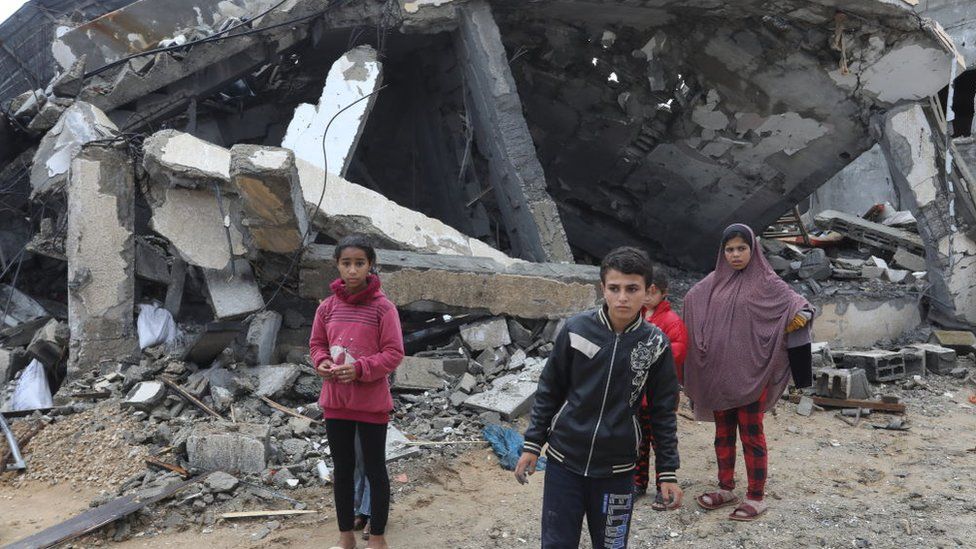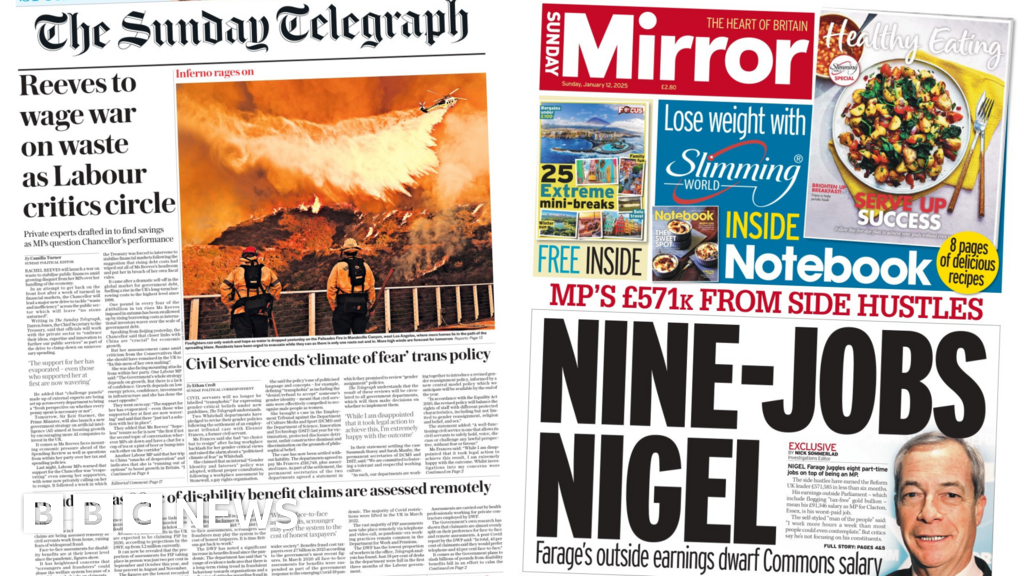 Image source, Getty Images
Image source, Getty Images
The US has grown increasingly concerned over mounting civilian deaths in Gaza.
By Tom Bateman, State Department Correspondent
BBC News
The US says Israel may have used American-supplied weapons in breach of international humanitarian law in some instances during the war in Gaza.
It is "reasonable to assess" that those arms have been used in ways "inconsistent" with Israel's obligations, says the state department.
But it added that the US did not have complete information in its assessment and that shipments could continue.
The report was submitted to Congress on Friday after a delay.
The White House-ordered review looked into how the country, along with six others engaged in conflict, has used US-supplied arms since the start of last year.
While the report was a clear rebuke of some Israeli operations in Gaza, it stopped short of definitively saying that the Israel Defense Forces (IDF) campaign had breached international law.
Israel had had to confront an "extraordinary military challenge" fighting Hamas in Gaza, it said.
And it added that assurances it had received from Israel about adhering to the legal use of US weapons were "credible and reliable".
The document also noted that because Hamas "uses civilian infrastructure for military purposes and civilians as human shields", it was often "difficult to determine facts on the ground in an active war zone" of what are legitimate targets.
But it said that given Israel's significant reliance on US-made weapons, they had probably been used "in instances inconsistent with its IHL [international humanitarian law] obligations or with established best practices for mitigating civilian harm".
It added that "Israel has the knowledge, experience, and tools to implement best practices for mitigating civilian harm in its military operations", but that "results on the ground, including high levels of civilian casualties, raise substantial questions as to whether the IDF is using them effectively in all cases".
The report said the UN and humanitarian organisations had described Israeli efforts to mitigate civilian harm as "inconsistent, ineffective and inadequate".
The state department found that Israel did not fully co-operate with US efforts to "maximise" humanitarian aid into Gaza in the initial months of the conflict. It said, however, that this situation had changed.
"We do not currently assess that the Israeli government is prohibiting or otherwise restricting the transport or delivery of US humanitarian assistance," the report said.
One of the contributors to the report, David Satterfield, a former US ambassador to Turkey, told the BBC that the report was the first of its kind and that the US would continue to keep Israeli actions "under review".
"This is a conflict quite unlike any that the world has seen," he added. "We tried to take account of all those factors in coming up with a very frank, but also credible judgement."
The report was finally released days after US President Joe Biden publicly threatened to withhold certain bombs and artillery shells from Israel if it went ahead with an assault on Rafah, the last stronghold of Hamas in Gaza that is packed with more than a million Palestinians.
Shortly before the report's publication, Israeli Prime Minister Benjamin Netanyahu dismissed President Biden's warnings that the operation in Rafah would cross a "red line" and vowed that Israel would "stand alone" if necessary.
More than 80,000 people have fled Rafah since Monday, the UN says, with Israeli tanks reportedly massed close to built-up areas amid constant bombardment.
Israeli troops took control and closed the Rafah crossing with Egypt at the start of their operation, while the UN said it was too dangerous for its staff and lorries to reach the reopened Kerem Shalom crossing with Israel.
Israel launched a military campaign in Gaza to destroy Hamas in response to the group's attack on southern Israel on 7 October, during which about 1,200 people were killed and 252 others were taken hostage. More than 34,900 people have been killed in Gaza since then, according to the territory's Hamas-run health ministry.
 (1).png)
 8 months ago
14
8 months ago
14


















